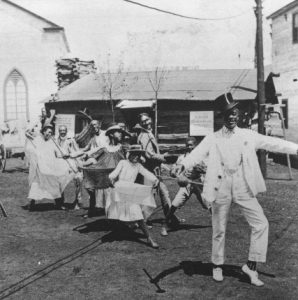The Cakewalk is an African American social and performance dance, derived from dances of corn-husking festivals. The Cakewalk was a traditional African American from of music and dance which emerged among southern slaves. Those who won the dancing contest would win a cake, from where the term is derived.1
Here’s where the history on the Cakewalk get’s a little fuzzy. Some sources say it began as a parody of the formal European dances of the white slave owners, but went on to become a popular attraction patronized by white landowners.2 Meanwhile other sources say “Black performers brought dances such as the cakewalk, the shimmy, and the Charleston to the American and European public, and in the process they challenged and redefined constructions of race, gender, and nationality.”3 Both very strong opinions on the same variety of music!
No Cakewalk On The Program For the State Convention of Afro-American Leagues–A Haytian Lecturer’s; “New York Age” (New York, New York) • 05-03-1890 • Page 2
I stumbled across an article that was published in Rochester NY on April 29th (c. 1890) praising the African American community, but bashing the Cakewalk. The article praises the African American women of Rochester saying “that in no city of New York are the Afro-Americans more thrifty then our people here… Our ladies [the African American “ladies” of Rochester] are educated and refined”4 Is this statement biased? Absolutely! I still was intrigued because this is perspective we don’t read don’t find very often — especially in the 1890s. The article continues, “Of course, Rochester, like other cities, has a few Afro Americans who can not appreciate a notable gathering of their own race at a banquet or a state convention as will take place in this city May 22. They will not be seen at the banquet because there is no cakewalk on the program”4 Ouch… This statement detracts from the compliment made towards the African American women of Rochester earlier in this newspaper article. This article praises the culture of African American women, as long as their culture is now one that appreciates “notable” things such as “banquets” or a “state convention”. They praise African American women for adopting white European ideals of sophistication and anything else is seen as “less than”. Problematic? Incredibly. The article is titled “No Cakewalk on the Program for the State Convention of Afro-American Leagues”. The author creates a division among the African American women of Rochester NY. It personifies naturalization which in this case I would define as: we’ll allow you to become part of our society, only if you become like “us” ( this “us” meaning white people). This author completely dismantles and discourages historically African American dances and ideals thus defining a superior and inferior culture.
Work Cited

